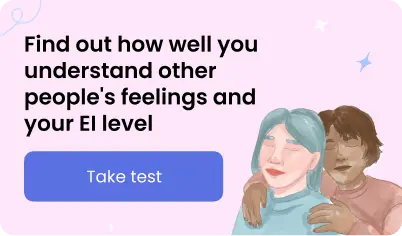People who identify as empaths frequently characterize themselves as being extremely sensitive to the feelings, energies, and experiences of others, to the point of experiencing their happiness or sorrow.
What is disordered empathy? Although empathy is a basic human trait required for compassion and social interaction, some people show extreme sensitivity while others may significantly lack it, which begs the question of whether empathy can turn dysfunctional.
Is there a clinical basis for this concept, or is it simply a heightened personality trait? What occurs if empathy is lacking or becomes overwhelming? This article examines the range of empathy, the possible psychological effects of excessive empathy, and related disorders such as Empathy Deficit Disorder and Hyper-Empathy Syndrome. While not a formal diagnosis in the DSM-5, it’s a term used to describe a wide range of behaviors and personality traits that can cause problems in relationships and social interactions.
What Is Empathy & the Empath Spectrum?
Empathy is a significant human capability for building and maintaining relationships and reacting compassionately to other people’s emotions. Empathy exists on a spectrum, ranging from people who are less attuned to others’ emotions to those who feel them so deeply that it influences their own thoughts and behaviors.
The term “empathy” has evolved over time. In the early 1900s, empathy was understood as the ability to “project one’s own feelings onto the world” or to connect with an object. By the mid-20th century, researchers had shifted direction and began to consider empathy as an accurate assessment of another’s thoughts or feelings.
Social psychologist Daniel Bateson, who had studied empathy for decades, proposed eight different concepts that are combined into the concept of empathy:
- Awareness of the thoughts and feelings of others: we know that we are not the only ones in this world who have feelings.
- The ability to imagine the thoughts and feelings of others: we see the emotion, are able to analyze it, and have some theory of what that person is feeling based on our own lived experiences of emotion.
- To assume the postures of the person: this is how a certain non-verbal interaction arises. Also, seeing a certain facial expression or emotion in a movie, we can make presumptions of what the character is feeling.
- To actually feel the same way as someone else with all their life circumstances, and understand why they are the way they are.
- The ability to imagine what a person would feel or think, to perceive the point of view of another person. For example, in an argument, one needs to find the strength to understand what the other person means.
- The ability to experience the suffering of another: at the moment when we see a person who has just been hit in the face, we seem to feel this on ourselves.
- Sympathy for the suffering of others is sometimes also called compassion.
- Projecting oneself into the situation of another: the ability to imagine oneself in the place of another person, to feel what they are feeling at that moment.
This shows how different the ideas about “what is an empath?” are among different authors.
What Are the Levels of Empathy?
Researchers distinguish five levels [5]. They depend on how aware a person is of their own feelings, because when they understand themselves, they can better understand others.
- The first level. A person doesn’t feel empathy at all, and other people’s emotions and experiences cause only irritation or hostility.
- The second level. A person is capable of empathy, but they don’t like this feeling; it causes discomfort.
- The third level. A person does feel empathy internally, but they don’t express it. They might deeply understand and even emotionally resonate with someone’s struggles, but choose to hide or suppress their reactions.
- The fourth level. A person has empathy, supports other people in words, but is passive in actions.
- The fifth level. A person not only feels empathy, but also actively acts. For example, they actively pursue supporting a person whose struggles they observe.
The Empath Spectrum
The empath spectrum can be categorized into three general types, according to the Stanford Encyclopedia of Philosophy [3]:
- Cognitive Empathy: Understanding another person’s perspective or mental state.
- Emotional (or Affective) Empathy: Feeling another’s feelings.
- Compassionate Empathy: A combination of cognitive and emotional empathy, paired with a desire to help or support.
At one end of the spectrum are people with low empathy, sometimes associated with antisocial personality disorders. At the other extreme are highly sensitive people (HSPs) and people who experience extreme empathy [4].
Empathy Deficit Disorder
Empathy Deficit Disorder (EDD) is a term sometimes used to describe people who struggle to understand or relate to the emotions of others.
It is important to say that Empathy Deficit Disorder is not an official diagnosis within the DSM-5, but it is often discussed in the context of narcissistic personality traits, people with antisocial disorder, autism spectrum disorder (ASD), and sociopathy [10].
People who experience Empathy Deficit Disorder may show the following traits:
- Difficulty forming emotional connections
- Inability to recognize or react compassionately to people’s emotions
- Self-centered or dismissive behaviors
- Lack of self-reflection

Common Behaviors of People with Empathy Deficit Disorder
The inability to empathize with others and understand their feelings, i.e., lack of empathy, can be expressed in the following ways:
1. A critical or judgmental attitude
Empathy involves understanding that people can act for different reasons. People lacking empathy tend to be suspicious and attribute hostile intentions to others, even in minor situations. For example, they may decide that a driver who cut them off in traffic did so on purpose to offend them. This is also one of the typical narcissist traits.
2. Lack of interest in other people’s feelings
An indifferent or intolerant attitude toward other people’s emotions is a sign of a lack of empathy in a person. Such people often interrupt others when they’re trying to share their feelings, or give ill-considered advice that can only make the situation worse. For example, they might say, “Just calm down,” “You shouldn’t be so upset,” or “You’re being overly dramatic.”
Lack of interest in other people’s feelings can also be misinterpreted. For example, traits of an otrovert include being independent, even from the judgment or compliments of others. This can be seen as dismissiveness.
3. Tendency to blame others
This trait is typical of different types of narcissism. People with low empathy are not always aware of how their behavior affects others. Instead of taking responsibility for their actions, they may blame others. Moreover, a lack of empathy may cause victim-blaming.
The reason is that people who lack empathy often use a psychological defense mechanism, shifting responsibility for other people’s misfortunes onto the victims themselves. This behavior allows them to feel safe and protected from such troubles. For example, they may claim that the person robbed was not careful enough.
4. Inability to cope with emotional situations
For a person who has difficulty empathizing, other people’s emotional expressions can be unclear and even frightening. Due to their inability to recognize and understand the feelings of others, they often don’t know how to behave. In such situations, they often choose avoidance, for example, leaving the room when someone expresses strong emotions.
5. Inability to forgive
A lack of empathy often makes people take things personally. As a result, forgiving others’ mistakes is difficult for them, since they can’t understand the motives and emotions of others.
A classic example is a person who cannot forget an insult from the distant past for years. Or, for example, someone who is not ready to give a second chance to a person who made a minor mistake.
6. Accusing someone of overreacting
A person who is unable to empathize often assumes that everyone sees the world exactly as they do. If a joke doesn’t offend them, they don’t understand why it can offend someone else. Or, if they don’t think a problem is important, they may think it shouldn’t matter to others.
They may often say phrases like, “You have no sense of humor” or “Learn to take a joke.” Such indifference to hurting or mistreating others, as well as rationalizing or justifying harmful actions, is also common among people with Antisocial Personality Disorder (ASPD) [14].
7. Refusal to apologize
A lack of empathy may show up in indifference to other people’s feelings. A person lacking empathy might be unable to put themselves in someone else’s shoes and understand their experiences. They might often act selfishly, without thinking about the consequences of their actions. Subsequently, taking accountability for their role in someone else’s hurt feelings may feel nearly impossible due to their misunderstanding of their behavioral impacts on others.
Hyper-Empathy Syndrome
Hyper-empathy syndrome is on the opposite side of the spectrum. It is an informal term for overly sensitive people who show an excessive or overwhelming level of empathy. Other people’s emotions frequently have a profound impact on people with hyper-empathy, sometimes to the point of physical symptoms or emotional distress. While this is not an official diagnosis within the DSM-5, this can describe traits of those with varying personality disorders and Autism Spectrum Disorder.
Key signs of Hyper-Empathy Syndrome include:
- High sensitivity to the emotional expression of others
- Difficulty distinguishing other people’s emotions from their own thoughts
- Tendency to absorb negative feelings
- Avoidance of emotionally charged situations
- Difficulty setting healthy boundaries
Hyper-Empathy Syndrome is not officially recognized in medical literature, but it shares similarities with traits found in Highly Sensitive Persons (HSPs) and certain personality disorders.
For instance, hyper-empathy often accompanies borderline personality disorder or those with Neurodiversity. It is difficult for people with BPD to regulate their emotional reactions and their manifestations. Thus, their emotions are out of control and can be accompanied by impulsive behavior and the subsequent feeling of emptiness, causing emotional or empathic distress.
It would seem that heightened compassionate empathy is a good quality, but it can mentally hurt a person. Moreover, the cause of hyper-empathy may be a childhood trauma, emotional neglect, or an upbringing where they did not put their interests first [8].
Hyper-empathy is also often experienced by children of narcissistic parents or children of emotionally immature parents who strive to please others or help them, even if it causes them significant inconvenience [9].
People with hyper-empathy may be prone to frequent mood swings, dependence on partners, and other people for emotional regulation. Excessive empathy can be replaced by resentment and disappointment in life. They can also depend on the recognition of those around them. When they don’t receive recognition, people with hyper-empathy can feel abandoned, isolated, and lonely.
Have you ever wondered how your childhood influenced your adult life? Find out with a quick trauma test.
Traits of People with Hyper-Empathy
Even though cognitive empathy is frequently considered a positive trait, the innate ability to and deep self-reflection can come at a cost. People with heightened cognitive and affective empathy may show the following emotional traits, according to research by social neuroscientist, psychologist, and world expert on empathy and compassion Tania Singer [11]:
1. High or hyper-emotional sensitivity
People with hyper-empathy experience emotions more strongly than others. They can literally absorb the other person’s emotions and experience them as their own pain, thinking, “Why am I so emotional?”. As a result, if there is a lot of negativity, stress, and conflict around them, they may wonder, ”Why do I feel empty?”
2. Compassion and caring for another’s feelings
Those with high empathy often have a powerful capacity to care for others. This can be seen in their innate ability to help or support someone who seems upset, even if they haven’t asked for this.
3. A chronic sense of internal hollowness after social interaction
Tense one-on-one conversations or big crowds can all contribute to this emotional exhaustion, making a person wonder, “Why am I so sensitive or drained”?
4. Need for solitude to recharge
People with hyper-empathy might need solitude to recover from emotional overload and manage negative feelings. They learn how to feel their feelings through quiet time alone.
5. Tendency to avoid conflict
People with high emotional empathy frequently find it very uncomfortable when others express aggression. Moreover, they might sense when someone is lying or hiding emotions, which creates additional tension for them.
6. Having a hard time standing up for healthy boundaries
They often put the needs of others above their own. This, in turn, makes them more susceptible to emotionally tense situations and toxic people.
7. Emotional or empathic distress or exhaustion
For people who experience hyper-empathy, absorbing another person’s emotions can be extremely tiring. Over time, this continuous emotional intake can make them feel emotional exhaustion and burnout. In this case, the person may feel disengagement and a cynical attitude to work, thinking, “Why am I so unmotivated?”.
Moreover, a specialist in rehabilitation programs, Mark Stebnicki, introduced the concept of “empathic fatigue.” It confirms that constantly dealing with the grief and loss of others, people experience burnout—feelings of emptiness, physical exhaustion, and loss of interest in life [12].
8. Anxiety or mental health conditions
Even if their life is fine, an empath may begin to perceive the sadness of someone who is very depressed as their own pain. Furthermore, people with compassionate empathy may even experience depressive symptoms if they continuously take in the negative feelings of a loved one going through a difficult period.
9. Emotional dependency and enmeshment due to their difficulty forming healthy boundaries
People with high affective empathy might find it hard to say “no” to others or feel obliged to support them. They might find it challenging to keep their emotions and those of others at a healthy distance.
The reason is that people with hyper-empathy may be concerned about disappointing or upsetting other people. This lack of boundaries can ultimately result in emotional enmeshment, where people’s emotional boundaries become blurred and unhealthy, or emotional dependency in relationships, where one person’s sense of self-worth is linked to the needs and feelings of another, wondering, “Why do I feel guilty all the time?”.
10. Struggles to regulate emotions in social settings
The reason is that experiencing all of the emotions of so many people at once overwhelms people with hyper-empathy. For example, an empath may have extreme anxiety before one big social event because of their expectation that they will be overwhelmed by the range of emotions.
The practical tips and resources on how to increase emotional intelligence in the workplace may help you be more productive if you have an office job.
Do you have anxiety in social settings?
Is Being a Hyper Empath a Mental Disorder?
The Diagnostic and Statistical Manual of Mental Disorders (DSM-5) does not classify being a disordered empath as a mental disorder. However, because of their increased emotional sensitivity, hyper-empathy frequently coexists with anxiety, depression, or borderline personality disorder (BPD) [6].
Curious if your emotional sensitivity might be linked to something deeper? Take a free BPD test to learn more about your emotional patterns.
Emotional exhaustion, social disconnection, and overstimulation in crowded environments are among the negative feelings that people with hyper-empathy frequently report. These symptoms aren’t a separate disorder, but they can be serious enough to impact daily life. Thus, while “empathy disorder” is not a recognized clinical term, the question of the diagnosis of the disorder of empathy remains controversial among mental health professionals.
It happens that a person is capable of empathy but has no contact with their own inner world. When they observe other people, they may identify themselves too much with them. As a result, emotional tension grows, causing irritation, anger, anxiety, and fear. Eventually, tension can develop into empathic distress.
This phenomenon is called dysregulation of empathy when a person can’t control the feelings that arise as a reaction to other people. They may not help or sympathize, and outwardly appear indifferent. But in fact, a person may experience extreme empathy that they can’t cope with and, as a result, become dysfunctional in expressing empathy [7].
Mental Health Tips for People with High Empathy
The negative emotions people with hyper-empathy “pick up” from others can affect their work and personal life. Research confirms that emotional regulation can help people with high empathy reduce their distress [13].
Emotional regulation is the ability to respond to feelings in a healthy, rational way. In the context of empaths, this may mean learning to differentiate between your own feelings and others’ emotions, or learning skills to prevent yourself from feeling overwhelmed. Some strategies include:
- Practicing coping skills. Coping skills like breathing exercises, mindfulness activities, and other techniques can help people with heightened cognitive and affective empathy reduce anxiety and stay grounded in the present.
- Setting boundaries. People with high affective empathy may have trouble saying “no” or feeling obligated to help others. When people do this too often, they may feel “burned out.” Setting boundaries helps them stay mentally and physically healthy.
- Emotional expression. Emotional regulation does not mean that a person should suppress their emotions. For some, having a regular, enjoyable hobby, such as journaling, a creative hobby, or physical activity, may be helpful.
- Name what the other person is experiencing. Usually, labeling emotions helps people distance themselves from these feelings and gives them time to react. This is a useful technique both when dealing with their own feelings and when communicating with others. Saying something like, “He is feeling X,” acknowledges that the emotions belong to the other person, not you.
Thus, people with heightened cognitive and affective empathy need to use effective practices and tools to protect themselves from other people’s negative emotions. The Breeze app is one of these tools. Whether it’s managing emotions, understanding triggers, creating healthier habits, or building meaningful relationships with people, the app has it covered.
What else? More than 30 science-backed tests about childhood trauma, personal growth, and relationships provide a deep look into different aspects of your mind.
Expert Insight
Disordered empathy is a part of the symptology that can be presented during therapy. For example, disordered empathy, whether it be not having enough or too much empathy, can result from trauma, neglect, Neurodiversity such as Autism, or a symptom of a larger personality disorder. It’s helpful to gather background information that the client is presenting to see how the level of empathy is impeding one’s ability to function. Hyper-empathic people can struggle with anxiety and depression from blurred boundaries, and overexhaustion, trying to navigate big feelings constantly from those in their environments. A lack of empathy can show up as a theme in struggling to maintain relationships, jobs, and other established connections.
Katherine Scott
Mental health professional
How to Manage Empathy Deficit Disorder and Hyper-Empathy Syndrome with Therapy?
In therapy, people with hyper-empathy usually learn to set and maintain healthy boundaries in communication and say no. It is also important for them to master the technique to regulate emotions and work on their own self-esteem.
People with empathy deficit disorder may also need therapy, especially if the lack of empathy is associated with other disorders. To manage empathy deficit disorder, mental health professionals usually focus on increasing emotional awareness and improving social cognition.
Expert Insight
Therapy can be a safe and neutral place for someone to examine their core beliefs and perspectives that are influenced by their levels of empathy. Once a person has a grasp on the perspective of which they experience life and the world around them, then the person and therapist can explore helpful boundaries to establish in helping the person heal old wounds perpetuating the level of disordered empathy and establish more equilibrium with it.
Katherine Scott
Mental health professional
Sources
- Susan Lanzoni. The Origin of Empathy. November 2018.
- Stanford Encyclopedia of Philosophy. Empathy. June 2019.
- Acevedo BP, Aron EN, Aron A, Sangster MD, Collins N, Brown LL. The highly sensitive brain: an fMRI study of sensory processing sensitivity and response to others’ emotions. July 2014.
- Dilia Esther Aparicio, Alexis Enrique Ramos, Jesús Mendoza, Robert Utsman-Abarca, Aracelis Calzadilla-Núñez, Víctor Patricio Díaz-Narváez. Levels of empathy, empathy decline and differences between genders in medical students of Cartagena (Colombia). June 2018.
- Burghart M, Sahm AHJ, Schmidt S, Bulla J, Mier D. Understanding empathy deficits and emotion dysregulation in psychopathy: The mediating role of alexithymia. May 2024.
- Eisenberg, N., Fabes, R., Schaller, M., Carlo, G., & Miller, P. The relations of parental characteristics and practices to children’s vicarious emotional responding.
- Weilong Xiao, Xue Lin, Huaibin Jiang. The Influence of Emotion and Empathy on Decisions to Help Others. May 2021.
- Adam Smith. Emotional Empathy in Autism Spectrum Conditions: Weak, Intact, or Heightened? August 2009.
- Singer T., Olga M. Klimecki. Empathy and compassion. September 2014.
- Mark A. Stebnicki. Transcending Empathy Fatigue: Cultivating Empathy Resiliency. August 2024.
- Powell, P.A. Individual differences in emotion regulation moderate the associations between empathy and affective distress. 2018.
- Fisher KA, Torrico TJ, Hany M. Antisocial Personality Disorder. February 2024.
Disclaimer
This article is for general informative and self-discovery purposes only. It should not replace expert guidance from professionals.
Any action you take in response to the information in this article, whether directly or indirectly, is solely your responsibility and is done at your own risk. Breeze content team and its mental health experts disclaim any liability, loss, or risk, personal, professional, or otherwise, which may result from the use and/or application of any content.
Always consult your doctor or other certified health practitioner with any medical questions or concerns
Breeze articles exclusively cite trusted sources, such as academic research institutions and medical associations, including research and studies from PubMed, ResearchGate, or similar databases. Examine our subject-matter editors and editorial process to see how we verify facts and maintain the accuracy, reliability, and trustworthiness of our material.
Was this article helpful?







